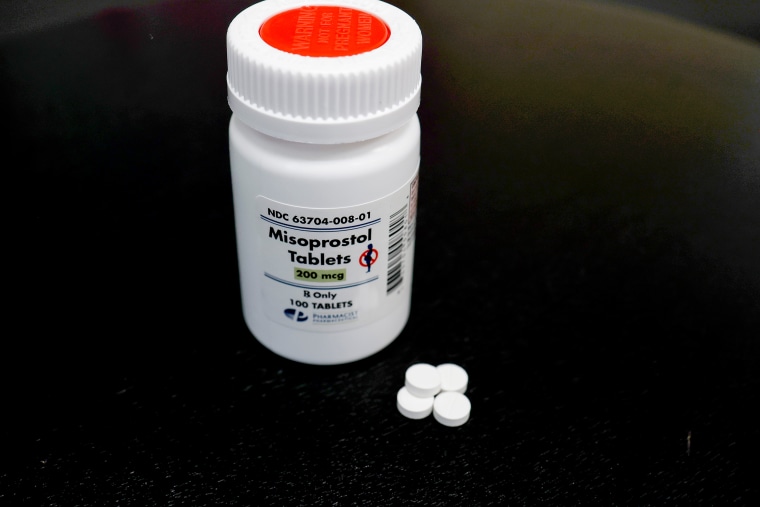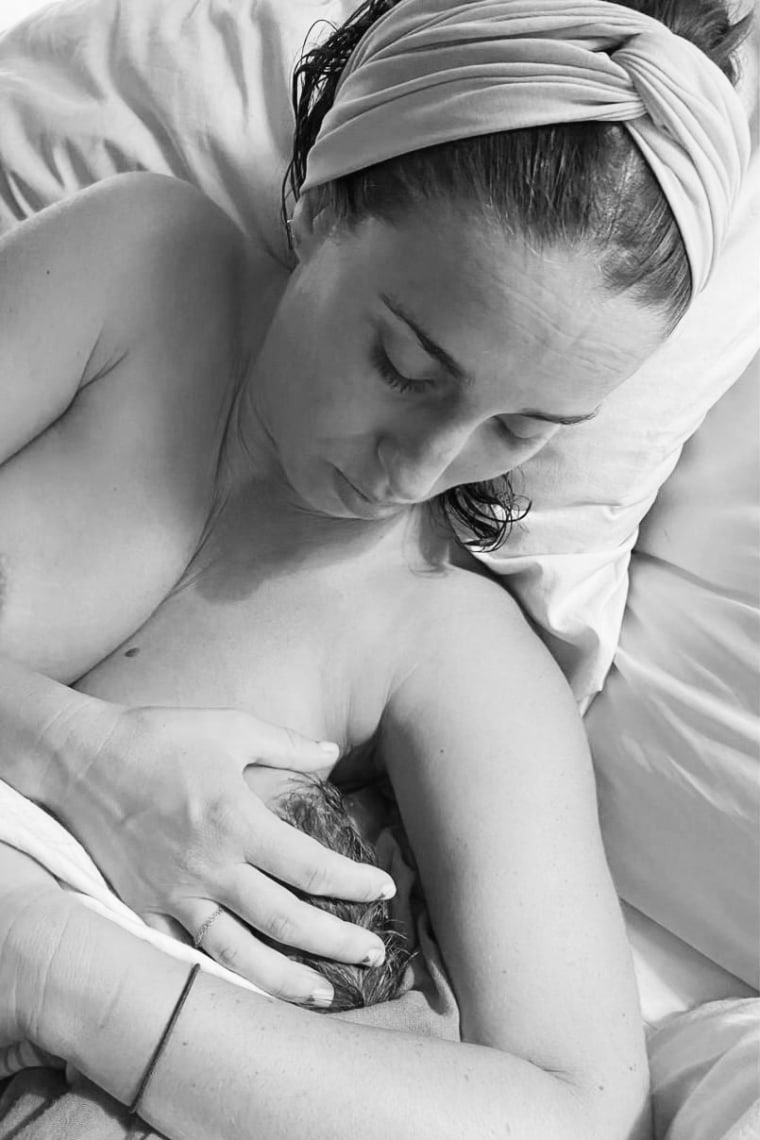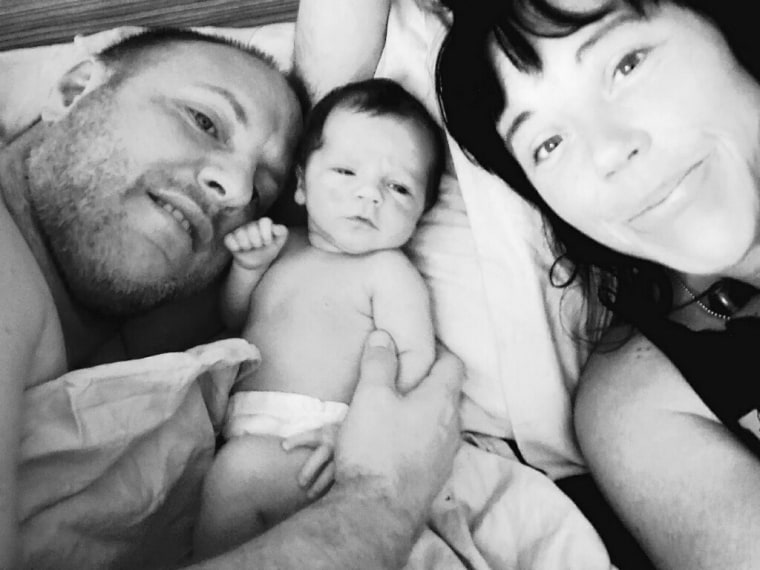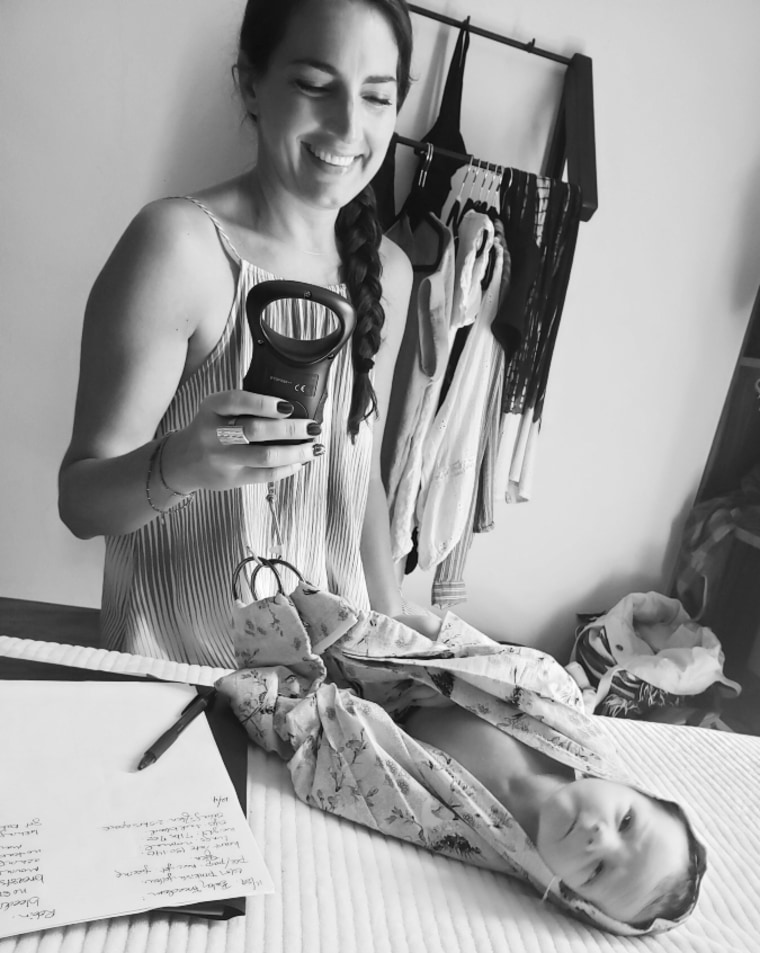Warning: This article contains imagery some readers might find disturbing.
Jennifer Nosek’s pregnancy was everything she had hoped for. After two miscarriages, she felt grateful and relaxed as her due date approached.
In Sayulita, Mexico, her part-time home, she and her friends gathered for a baby shower, wearing flower crowns to celebrate. She washed gently worn baby clothes from her first child that had been tucked away for six years.
Nosek, a Canadian magazine editor, had found a midwife to assist her in early labor at home. Heather Baker was known in Nosek’s community of Sayulita moms, and, though Nosek didn’t know it, Baker’s fierce defense of birth autonomy had gained her an online following in the tens of thousands.
Looking back, Nosek said, that was the moment it all fell apart.
“Everything was absolutely lovely until I let this person into my life,” she said.
In April, Nosek’s baby died during an intense and excruciating labor that Nosek now believes was brought on by a white pill she said Baker gave her shortly before his birth. In a complaint she filed with Mexican prosecutors, she alleges that Baker described the pill as a mild homeopathic but that it was actually misoprostol, a pharmaceutical used to induce labor.
The drug, she told NBC News, caused intense uterine contractions that she believes cut off her baby’s supply of oxygen. His government-issued death certificate lists “perinatal asphyxia” as the cause of death.
Nosek said that when she later confronted Baker and asked what she’d been given, Baker denied wrongdoing, insisting she gave her only the herb blue cohosh. But Nosek said the pill looked identical to one that Baker later told her was misoprostol.
In addition to her complaint in Mexico, Nosek has filed complaints with the FBI and the Wisconsin Department of Safety and Professional Services, the licensing agency in Baker’s home state, both of which are looking into her claims.
Nosek’s story spread, first in the tight-knit Sayulita community and then outside it, in online pregnancy groups and midwives’ collectives. Soon other clients emerged, many of whom shared their own concerns about Baker.
At least six, as well as a former apprentice, have lodged complaints against Baker with the Wisconsin licensing agency, which cited her in 2014 for practicing without a license. A friend of Nosek’s encouraged the women in Mexico to file complaints with the agency, which has reopened its investigation into Baker.
Some of those clients, like Nosek, say Baker gave them a tincture or pill she described as a “homeopathic” that they now suspect was a pharmaceutical drug, based on the sudden, strong contractions that followed. A complaint filed by Baker’s former apprentice said that on many occasions, Baker recommended that women take the drug progesterone to stall their labor until she could join them in Mexico.
NBC News interviewed 10 women who say they gave birth with Baker, two in Wisconsin before 2014 and eight in Mexico in the years since. Four of those women have filed complaints with the state licensing agency. At least two of the women, in addition to Nosek, have spoken with the FBI about their experiences.
Baker didn’t respond to multiple calls or to a list of written questions NBC News sent seeking comment for this article.
On social media, accounts with the usernames “Heather Baker Midwife” and “heatherbakermidwife,” one of which had her photo, sent “cease and desist” messages to Nosek and another former client. Viewed by NBC News, they accuse the women of making “false and defamatory statements.”
Caroline Clancy, public affairs officer with the Milwaukee division of the FBI, declined to confirm the investigation, citing Justice Department policy.
“As in any given matter, if charges are filed, they will eventually become a matter of public record,” she wrote in a statement.
John Beard, a spokesperson for the Wisconsin licensing agency, declined to answer questions about Baker, citing an ongoing investigation. In a statement, he said the state’s “options are limited” when it comes to unlicensed professionals accused of violating rules outside the state and would usually depend on the laws of the other jurisdiction.
The Mexican federal prosecutor’s office referred NBC News’ calls to its Nayarit division, which didn’t respond to questions. The Sayulita police and prosecutor’s offices didn’t return calls seeking comment.

On her website, Baker says she isn’t currently attending births in person, a change to the site made in April. But Nosek wants to see her held accountable.
“I don’t even have words for the violence that was done to me,” Nosek said. “I’m going to spend the rest of my life trying to figure out how to deal with the trauma of what happened.”
When Nosek and her husband, Rene Lemos, an architect, and their son, Joaquin, first arrived in Sayulita, a fishing village on the western Mexican coast, in 2021, they joined a community of expatriates from the U.S. and Canada. The surfers had waves. The foodies had fish tacos. The kids had an outdoor school.
And the newcomers eager to start or grow their families with minimal medical intervention had Baker.
Nosek’s first birth had been a cesarean section, which she hoped to avoid this time. But she wasn’t set on a home birth, she told NBC News. She was prepared to go to the hospital or even have another C-section if needed. She said Baker assured her she could transfer to a hospital if any problems arose.
In general, midwifery treats birth as a natural process in which little intervention is necessary. The women who choose midwives and home births do so, in part, because they want more control over their bodies and births.
Nosek said she was OK with the idea of a homeopathic medicine to advance her labor but wouldn’t have consented to being induced with a pharmaceutical at home, calling such a plan “profoundly unsafe.”
A veteran midwife expressed alarm at the allegations that someone in their field would give medication without informing their patients.
“How do you have full autonomy if you don’t have consent to things you’re agreeing to?” said Stephanie Mitchell, who is a certified professional midwife and the founder of a birth center in Alabama. “That’s like the antithesis of midwifery care.”
Baker herself gave birth to five children at home, she says on her website. Four of her deliveries were unassisted, a practice known as freebirthing. In 2019, she published a guide to the practice.
“I follow the ways of our elders and ancestors,” she writes on her website, “using nature and healthy foods for nourishing, herbs for healing, as well as our intuition, free of conditioning by societal constraints.”
On an October 2022 podcast, Baker said Mexico’s notoriously high C-section rate was one reason she spent so much time traveling to the country.
“This is why my heart is specifically in this area,” she said.
Her website notes that Baker was trained as a “traditional midwife” and has been attending births since 1996. Traditional midwives typically learn through apprenticeships and often choose not to become licensed because of philosophical, religious or personal reasons.
In Mexico, traditional midwives are usually women from rural and Indigenous communities, with knowledge passed down through generations. While the Mexican government doesn’t recognize traditional midwives as professional providers, they have in recent years gotten more legal recognition and are permitted to attend low-risk births.
In Baker’s home state, Wisconsin, a license is required to practice midwifery.
In 2014, the Wisconsin Department of Safety and Professional Services cited Baker for violating the law, noting that she had “assisted one or more women in pregnancy and childbirth.”
In a signed stipulation, Baker agreed not to practice midwifery in the state unless she was properly licensed, and it’s unclear whether her work in Mexico, if it was arranged in Wisconsin, would qualify as a violation.
Baker is open about the fact that she rejects licensure because she views it as a form of government interference. “I don’t think government should be up in our vaginas or uteruses,” she said on the 2022 podcast.
Describing herself as a “birthkeeper” on her website, Baker emphasizes tapping into instinct and the environment for answers. Part of that includes her use of herbs and homeopathic medicine.
In the podcast, Baker said she carries herbs to speed up labor. “It doesn’t mean I necessarily use them,” she said. Three clients, including Nosek, told NBC News that Baker recommended blue cohosh, traditionally used during childbirth in Indigenous communities, to help encourage their labor.
While blue cohosh can be used to induce labor, “it carries potentially serious though rare risks to mother and baby,” said Dr. Aviva Romm, a midwife and licensed physician, who wouldn’t comment on Baker specifically. Research has found it can cause a stroke in the fetus or infant. Though its timing and effectiveness can vary among recipients, Romm, who is also an herbalist, said “it does not throw somebody immediately into labor the way misoprostol or pitocin can.”
“It’s typically a slower, incremental onset, over multiple doses,” she said.

Even if Baker were licensed in Wisconsin, she wouldn’t be allowed to use “prescription pharmacological agents” to induce or augment labor, according to state regulations. But in Mexico, many medications, including misoprostol, can often be purchased without prescriptions, and midwives aren’t explicitly barred from providing them.
Midwives sometimes carry misoprostol in case of postpartum bleeding. Widely known for its role in medication abortions, it is also used to induce labor. But three doctors told NBC News it is risky in situations like home births, in which it is more difficult to monitor fetal heartbeats continuously. And for patients like Nosek who have had previous C-sections, the American College of Obstetricians and Gynecologists says, it shouldn’t be used at all.
Baker’s former apprentice, who asked not to be named for fear of repercussions to her family, told NBC News that she believes Baker was also using it to induce births.
She pointed to a 2019 Facebook message she said Baker sent her in response to learning of a difficult birth attended in Sayulita by the apprentice alone. NBC News viewed the message, which comes from an account with the username Heather Baker. “If I were there I would have given her ¼ miso as a last resort,” she texted, “kick in contrx to see if that worked. if not then we know c sec is the way to go.”

Luciana Suarez, who lives in Sayulita, is one of the clients who now question their births with Baker. In February 2021, when she was roughly 38 weeks pregnant, she agreed with Baker’s assessment that she was getting “big.” Baker floated the idea of inducing labor with herbs, Suarez said, and she consented.
Around 9:20 a.m. on Feb. 16, 2021, Suarez said, she took half of what Baker described as a homeopathic pill. Almost immediately, she said, she began to have contractions. After she took the second half, they became aggressive, she said, with almost no break between them.
As she began to push, her daughter’s shoulders became stuck in her birth canal, a dangerous emergency called shoulder dystocia. Baker managed to dislodge the baby, Suarez said, who survived.
That week, Suarez said, she told a local midwife helping with the baby’s birth paperwork that Baker had induced her delivery.
When she described what happened, the midwife grew concerned. She asked Suarez whether Baker had given her a white pill. She was certain an herb or a homeopathic wouldn’t work so quickly.

“I knew she was right back then, but I never dove into it, and I never questioned Heather,” Suarez said. “I think I was scared and intimidated because everybody else in town loved her so much, and I didn’t want to be the only one who had this really s—– thing that happened to them.”
Misoprostol isn’t the only pharmaceutical medication Baker is accused of using, according to the Wisconsin licensing agency complaints. An anonymous client and Baker’s former apprentice allege that she recommended progesterone to stall deliveries.
Another client, Becky Whitmore, said in an interview that when she went into labor at 40 weeks in 2019, Baker instructed her to take progesterone so she could attend the birth. In a Facebook message to her apprentice viewed by NBC News, Baker said she hoped the medicine would “postpone” the birth for 30 hours, enough time for her to travel to Mexico.
Two OB-GYNs and a veteran midwife expressed alarm at the alleged intervention in interviews.
“Progesterone is never used to try to stall full-term labor,” said Dr. Kate McLean, a board certified OB-GYN in Washington state. “That’s not a thing that we do.”


Robin Benedict, another client in Mexico who says Baker advised her to take progesterone, said she had a difficult birth in 2021, requiring that Baker resuscitate her daughter.
Both Suarez and Benedict filed complaints with the state of Wisconsin after learning of Nosek’s allegations and rethinking their own experiences. The complaints are still under review.
“Looking back,” Suarez wrote in her complaint. “I can’t wrap my brain around how dangerous it all was.”

As waves crashed behind her, Jennifer Nosek knelt in the sand in late March while the photographer’s camera clicked. Smiling, she posed in a black cropped tank revealing her pregnant belly.
The birth was only weeks away. They had installed a car seat and picked out a list of potential baby names.
On April 8, Lemos paid Baker a $2,000 deposit via PayPal.
Nosek said she was 40 weeks and five days when she started having false labor pains on April 11. Her contractions would start up and then stop for hours. The next day, she asked Baker to come over and check her.
Baker arrived around 2, Nosek recalled. Around 3:15 p.m., Baker checked her baby’s heartbeat and began massaging Nosek’s cervix with arnica oil. Nosek said she didn’t feel any contractions.
While Lemos played with Joaquin in another room, Nosek said, Baker gave her a white pill with a line down the middle that might help move things along, describing it as “a mild homeopathic.”
Nosek placed the pill under her tongue.
She recalled Baker saying, “Your baby will be born before sunset.”
Nosek left the room, sat on the toilet and rubbed her stomach. Then came a flash of pain. She said she folded over and cried out in agony.
“It was like a house on fire,” she recalled.
Nosek said it was hard to keep track of time. But she remembers feeling like her baby was stuck. Nosek and Lemos said they both asked Baker whether they should go to the hospital, but Baker warned that there wasn’t enough time. Lemos said that at that moment, with his wife in crushing pain, he felt torn. They could leave for the hospital, but what if something happened along the way? Ultimately, he said, he listened to Baker. “It was just chaotic,” he said.
In her complaints, Nosek alleges that Baker rarely used her fetal Doppler to check the baby’s heartbeat. After an initial check when Baker arrived, Nosek told NBC News, Baker checked his heartbeat only four times after her labor began.
For lower-risk pregnancies, the American College of Nurse-Midwives recommends checking every five minutes when patients are pushing. For labor inductions, even more monitoring can be required. In those cases, hospitals often use what’s known as continuous electronic fetal monitoring.
Just before 8 p.m. Nosek left the birthing pool to lie on the daybed. When Baker held her doppler to Nosek’s belly, Lemos couldn’t hear a heartbeat through its speakers.
The couple alleges Baker, however, said she heard a faint pulse.
Roughly 40 minutes later, Lemos watched as Nosek delivered their newborn son.
He wasn’t breathing.
Baker, Nosek said, tried to resuscitate him.
Lemos called an ambulance, but the first responders couldn’t resuscitate the baby.
Hours went by as they waited for the coroner. Nosek was still bleeding a lot, too much, she thought. She worried she might die, too. She needed to go to the hospital but refused to leave the house if it meant leaving their baby boy.
“It was the hardest thing ever,” Lemos said. “You can hold him, kiss him, feel him. He’s still warm.”
As strangers moved through her home asking questions and taking pictures, Nosek said, she was scared to move for fear of how much blood would drain out of her. At some point, she said, Baker gave her a pill meant to stem the bleeding.
Before she left in an ambulance, she demanded to know what medication she was given after the birth. Nosek said she watched as Baker scribbled down the name of the anti-hemorrhage medication: misoprostol 200 micrograms.
Later, as Nosek tried to piece together what happened, her mind would travel back to that moment and to the pills she said she was given, both before and after the birth. They looked identical, she said, but the first had been described as a “homeopathic,” and the second, according to the note she recalled, was misoprostol.
She started to suspect she’d been given misoprostol before she gave birth. When she searched for information about the drug, she found a warning that it shouldn’t be used for labor induction in a mother who’d had a previous C-section.
The couple also allege that after their son’s death, Baker urged them not to tell the police that she was a midwife or that they’d paid her but to identify her only as a friend. Lemos, worried that an open investigation would delay the release of their son’s body, agreed. There was no autopsy, and the baby’s death certificate says he died of perinatal asphyxia, a condition in which a fetus or infant fails to get enough oxygen.

Three doctors told NBC News that if she was given misoprostol, depending on the dose, it could have played a role. One of its most dangerous side effects is to potentially reduce a baby’s blood supply, which can limit a baby’s oxygen.
“It’s beyond what somebody could imagine would happen,” Nosek said. “You know — it’s not like something just went wrong in my birth and she failed to rise to the occasion. She created the emergency.”
In the weeks that followed the death of their son, whom they named Julian Zaire, Joaquin would pat Nosek’s belly, insisting his brother was there.
“I don’t even think I was in my body, you know?” she said. “I think I just separated from myself to survive it.”
Nosek shared her suspicions with an American midwife who arranged a call with half a dozen other midwives who listened to her story and offered their support. Meanwhile, Nosek’s friends in Sayulita began researching Baker’s past troubles in Wisconsin and connecting with other women who had birthed with her.
Similar themes emerged. Homeopathics and tinctures. Labor pains that came on suddenly. Improper heartbeat monitoring. Births that felt rushed or delayed to accommodate Baker’s schedule.
In late June, Luciana Suarez’s husband, Thai Shaffer, posted a message on Reddit publicly sharing allegations that Baker had given clients misoprostol without their consent. Baker sent Suarez a cease-and-desist message in response.
In August, in an email to Nosek, the FBI said interviews were underway. Nosek and Lemos are now working with a Mexico-based lawyer, who is gathering evidence in the hope that Mexican prosecutors will bring criminal charges against Baker.
“What I would like to see is for this to be a shadow that she cannot outrun,” she said. “So that everybody knows this is her and how she practices.”
On Salt Spring Island in British Columbia, there is a memorial garden built by Nosek’s mother dedicated to Julian Zaire. It has larkspur, sunflowers and dicentra, commonly known as bleeding hearts for the shape of their flowers. This summer, Nosek has spent time there with Lemos and Joaquin.
She thinks back to the family’s private viewing on April 19 and a list her sister wrote for her mother to read aloud about things Julian would never know.
“The sweetness of a peach in summer.”
“The smell of gum trees on a hot day.”
But Nosek has her own addition to that list, one she imagines telling Julian: “Of all the things you’ll never know, perhaps the worst is that you’ll never know how loved you were.”
Source link








